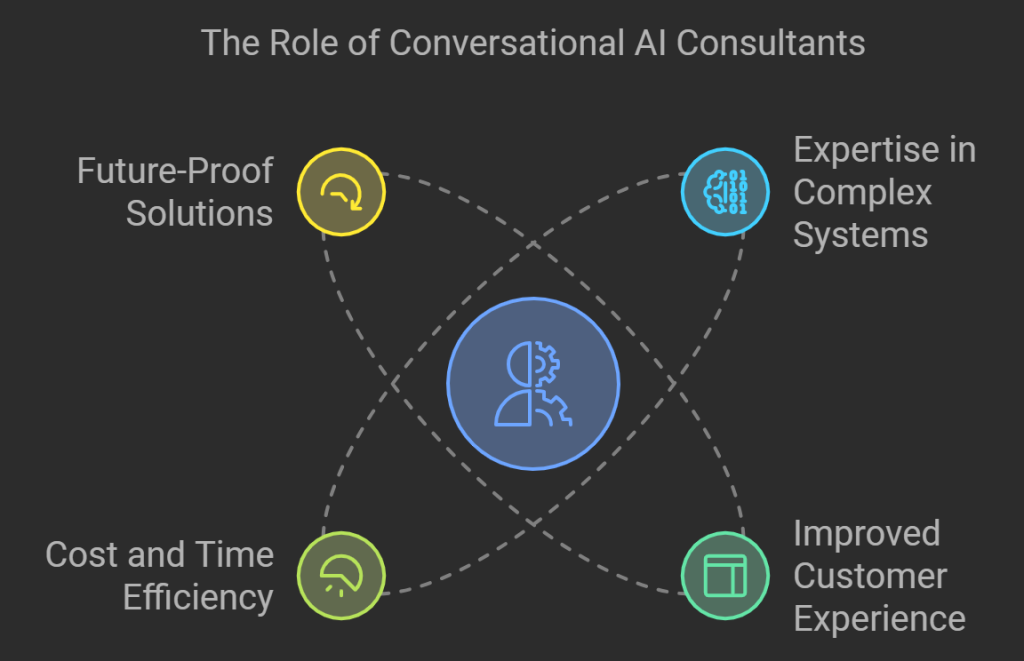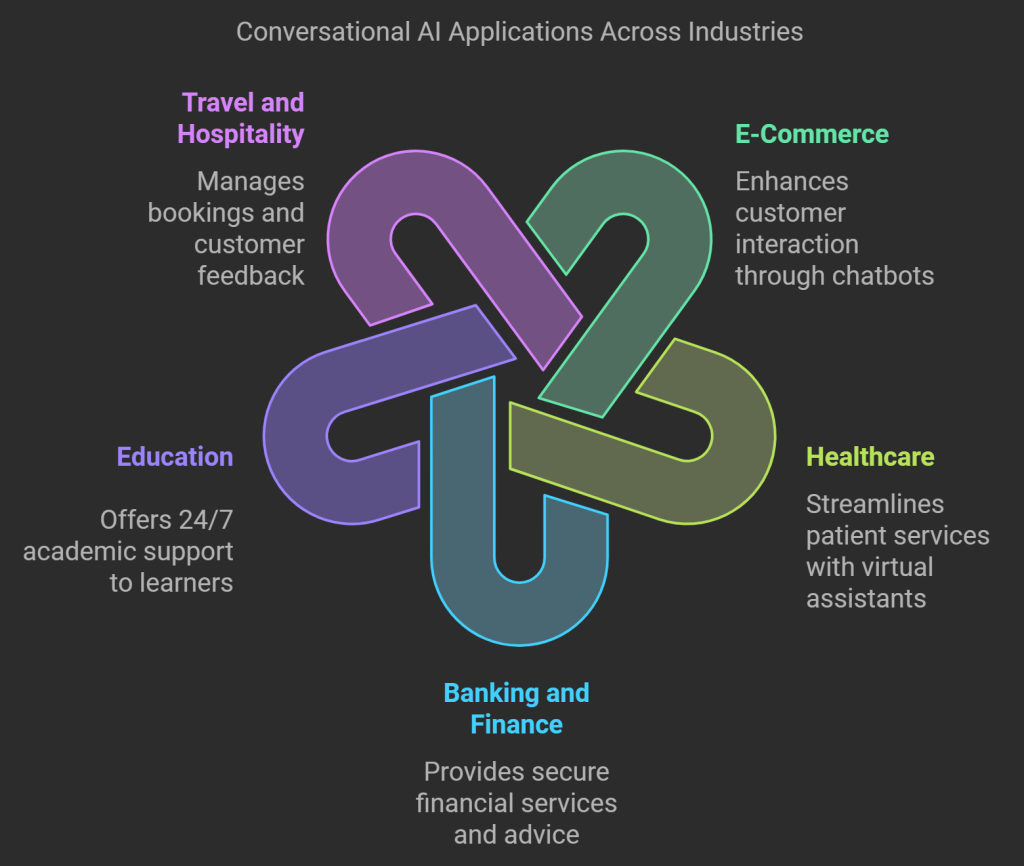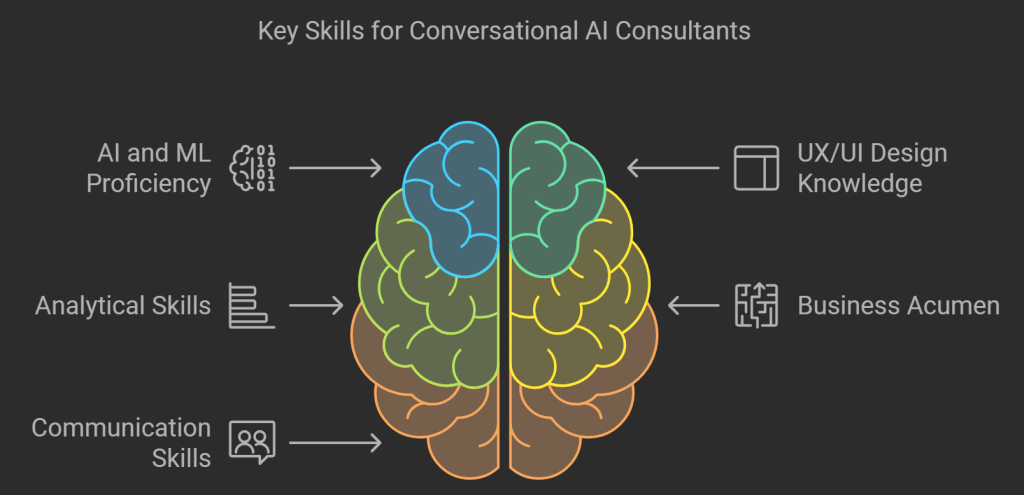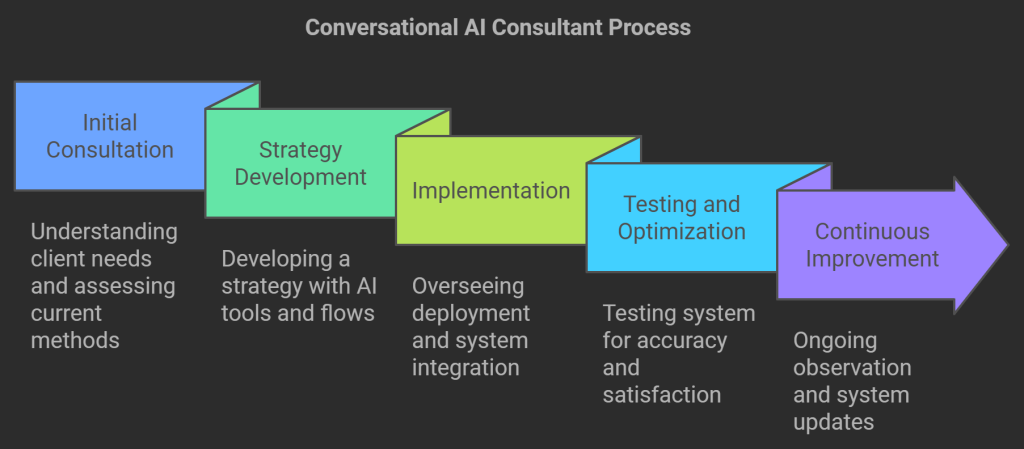Conversational AI Consultant
Making customer conversation is now embedded in modern business largely because conversational AI has put AI into the frontline of changing business. The functionality of conversational AI in the context of modern communication systems can be characterized as follows: modern systems of communication between brands and their customers are becoming popular and useful due to the use of chatbots and voice assistants. Alas, using the indicated advanced technology isn’t always quite clear.
This is where a conversational AI consultant comes into play. In this article, we’ll define what a conversational AI consultant is, explore their role, explain why they’re crucial, and outline the skills needed to succeed in this field.
What Is a Conversational AI Consultant?
A conversational AI consultant is a professional who specializes in designing, implementing, and optimizing AI-driven conversational systems like chatbots, virtual assistants, and voice recognition tools. Their main objective is to assist organizations build effective, persuasive, and smooth flow of communications with end users.

Key Responsibilities:
- Needs Analysis: What the business needs and where conversational AI can help it achieve goals.
- Solution Design: Designing conversation controls and choosing the right methods.
- Implementation: Managing the processes that allow the use of AI technologies in combination with other systems and technologies.
- Optimization: Ongoing assessment and relevant enhancements of performance as well as the systems that are in place.
Whether a company wants to streamline customer service or enhance user engagement, a conversational AI consultant is a pivotal player in achieving these goals.
Why Is a Conversational AI Consultant Important?

As businesses increasingly adopt AI-powered tools, the role of a conversational AI consultant is becoming indispensable. Here’s why:
- Expertise in Complex Systems Conversational AI is not just the process of deploying a chatbot or any other messaging-style system. Basically, it involves using machine learning and NLP and the creation of great user interfaces for the system. A conversational AI consultant ensures all these elements work together effectively.
- Improved Customer Experience Consultants create interfaces that are natural and seem logical to the end user and enable companies to deliver superior customer service. AI-driven systems are not without their problems; a bad design pits the user against it, but good design wins the user over.
- Cost and Time Efficiency The involvement of a consultant helps to channel the business substantial amounts of time and capital. Compared to random implementation, a consultant has established methods, and that is how one gets the results much faster.
- Future-Proof Solutions The technology being an artificial intelligence one advances greatly. That means a consultant makes sure that businesses implement only those systems that are scalable and can be adjusted in the future to complement changes.
Applications of Conversational AI Consultants in Different Industries

- E-Commerce A conversational AI consultant helps retailers create chatbots for product recommendations, order tracking, and customer support. For instance, AI in an online store or Wholesale Marketplace can help a fashion store to categorize their customer’s shopping experience, leveraging AI Powered Personalization.
- Healthcare In the area of health services delivery, consultants create virtual service providers that respond to questions from patients, set appointments, or even triage. This relieves the burden on the medical workforce and enhances the interactions of the patients with such technologies, as explored in our Artificial Intelligence in Healthcare Market Report.
- Banking and Finance Some of them that can apply conversational AI is used for banks to access account details, do transactions, and make financial recommendations. A conversational AI consultant ensures these systems are secure and user-friendly.
- Education AI tools are brought to educational institutions by consultants to enable institutions to offer round-the-clock online assistance to its learners, like responding to any query about a course or proffer academic assistance tips.
- Travel and Hospitality In the travel industry, a conversational AI consultant designs chatbots that handle booking queries, itinerary changes, and customer feedback, ensuring travelers have a smooth experience.
Skills Needed to Be a Conversational AI Consultant

To excel in this role, a conversational AI consultant needs a combination of technical, analytical, and interpersonal skills:
- Proficiency in AI and ML Consulting: A deep understanding of AI technologies, especially NLP, is essential for designing systems that can understand and respond to human language.
- UX/UI Design Knowledge: Creating an intuitive user experience is critical. Consultants must design conversational flows that feel natural and engaging.
- Analytical Skills: Consultants analyze performance metrics to identify areas for improvement, often using AI Data Analytics Tools to ensure systems meet business objectives.
- Business Acumen: Understanding the client’s industry and goals is vital for creating tailored solutions.
- Communication Skills: A conversational AI consultant often acts as a bridge between technical teams and business stakeholders, making clear communication essential.
How Conversational AI Consultants Work: A Step-by-Step Approach

Step 1: Initial Consultation
The process begins with understanding the client’s needs. This involves:
- Assessing current customer interaction methods.
- Identifying pain points and opportunities for AI implementation.
Step 2: Strategy Development
Based on the findings, the consultant develops a strategy that includes:
- Choosing the right AI platforms and tools, such as those highlighted in our article on Best AI Tools for Business.
- Designing conversational flows tailored to the business’s goals.
Step 3: Implementation
Once the strategy is approved, the consultant oversees the deployment of the conversational AI solution. This involves:
- Integration with existing systems like CRM or ERP, possibly incorporating AI Sales Software.
- Training AI models to understand and respond to specific customer queries.
Step 4: Testing and Optimization
Before full deployment, the system is tested for:
- Accuracy and response times.
- User satisfaction and feedback.
Step 5: Continuous Improvement
After that, there is ongoing observation by the consultant on how efficient the particular system is, plus fixation of ways through which it could be made perfect for its use and updating.
Real-Life Example of a Conversational AI in Action
- Case Study 1: Retail Transformation A global clothing retailer partnered with a conversational AI consultant to design a chatbot for customer service. In this case, the chatbot’s success can be seen well within six months—the reduction of the time taken to respond to customer issues by 50%, as well as an improvement in customer satisfaction.
- Case Study 2: Healthcare Innovation A hospital partnered with a consultant to deploy an artificial intelligent virtual assistant, as discussed in our Artificial Intelligence in Healthcare Market Report, to answer patient questions and make appointments. This system was able to address 80% of patient queries independently, reducing the burden on staff to handle such queries.
Challenges in Becoming a Conversational AI Consultant
- Staying Updated: AI technology is dynamic and improvements are made frequently, making it mandatory for consultants to be updating themselves frequently.
- Managing Expectations: Businesses expect quick returns on investment while managing AI systems, but the method requires time to be trained and optimized.
- Handling Data Privacy: Adherence to acts such as GDPR becomes vital when dealing with user information.
Consultation on the Future of Conversational AI
The demand for conversational AI consultants is only expected to grow. Here’s why:
- Increased AI Adoption: Even more companies are seeing the potential of using AI in communication.
- Advancements in Technology: In particular, the progress in the field of NLP and machine learning will affect the development of conversational AI.
- Focus on Personalization: The application of highly customized customer experiences, as seen in AI Powered Personalization, will be facilitated by consultants.
Conclusion
A conversational AI consultant is a vital partner for businesses looking to harness the power of AI-driven communication. Starting from idea to concept creation, to finding ways of applying conversational AI, and its effective execution, such individuals guarantee optimal returns on investment.
As AI continues to evolve, so does the role of the conversational AI consultant. No matter if you are an organization planning to implement artificial intelligence solutions or an individual thinking of entering this promising field, it is highly important to know the details about this profession.





